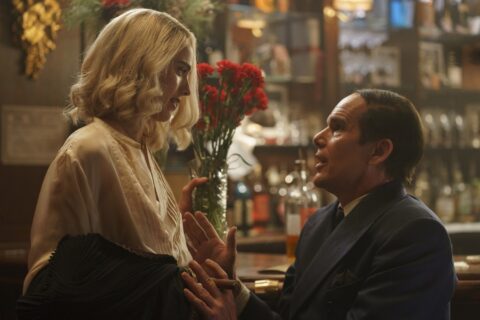Richard Rodgers came and left, but Lorenz Hart never left the bar.
Blue Moon (Richard Linklater, 2025) opens with icy blue rains, in which the great American lyricist Lorenz Hart (Ethan Hawke) shivers by the trash bins near Manhatton’s Eighth Avenue. Four days later, on November 22nd, 1943, he died from pneumonia. With 28 musicals and more than 500 songs including hits like “Blue Moon” (1934), “My Funny Valentine” (1937), “The Lady Is a Tramp” (1937) and “Manhattan” (1925), Lorenz Hart is half of Rodgers & Hart, one of musical history’s most successful songwriting partnerships.
Instead of a full biopic, the entire film is set on March 31st, 1943, the opening night of Oklahoma! By this time, Lorenz Hart had already succumbed to alcoholism, which prompted Richard Rodgers (Andrew Scott) to start a new partnership with lyricist Oscar Hammerstein II (Simon Delaney). The success of Oklahoma! kickstarted the legendary partnership Rodgers & Hammerstein, with many landmark productions in Broadway history including The Sound of Music (1959), Cinderella (1957), Carousel (1945), and South Pacific (1949).
Hart spends the night at the afterparty at Sardi’s bar, monologuing to the bartender and raving about Elizabeth’s (Margaret Qualley) charm, all to escape the fact that he too thinks Oklahoma! — this musical that Rodgers wrote with someone else rather than him — will become a classic. The singer Mabel Mercer once said that Hart was the saddest man she ever knew. Well, this night was probably one of the saddest nights of Hart’s life, full of heartbreak and longing for an irretrievable past.
After Before Sunrise’s (1995) train ride, Linklater once again chooses the perfect cinematic space, the opening night party of a theatre show, for a powerful meditation on life, art, love and depression. Ethan Hawke’s Hart is witty and charming, whose endless jokes are really cries for help. Yet no one seems to really listen, and no one seems to really care. Andrew Scott’s Rodgers looks at Hart with tenderness and pity, yet the hectic nature of opening nights drags him away, amidst the praises and bustle of the crowd. In a way, Blue Moon is also an intimate snapshot of the theatre world, infused with both its exhilaration and its coldness.
Blue Moon also has a distinct theatricality, with numerous monologues and scenes which all happen inside the same bar. Robert Kaplow’s script is captivating and packed with clever references, involving explorations of war and escapism and art and commerce.
Hart criticises Oklahoma! for being inoffensive. This comment didn’t age well, as recent adaptations (e.g. Wyndham Theatre, London, 2023) turn their focus on the sinister number “Pore Jud Is Daid”, in which the main character Curly essentially tries to convince the unsociable Jud to kill himself so that he can get the girl.
Like the misunderstood Jud, the attempt to discuss Hart’s homosexuality through the character of Elizabeth also seems to land more on a predatory infatuation. The conclusion was Lorenz Hart is simply drunk with beauty, be it men, women or the smell of cigarettes.

Ariadne is a film writer specialising in sensory and arthouse cinema.




